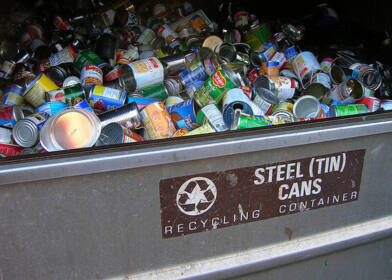In the fourth of our series about where our blue bin material ends up, we put the spotlight on steel cans and their recycling journey.
Ahead of European Week for Waste Reduction which takes place from November 18th to November 26th, we want residents to realise the important difference they are making by choosing to use their blue bin.
This amounted to 1.6% of all materials collected in the blue bin. But there is room for improvement as it is estimated that about two thirds of metals which could be recycled (steel and aluminium) end up in the black bin.
Steel production is an energy intensive process requiring the transformation of mined iron ore combined with coal and other fluxes such as limestone to remove impurities, into a raw material which can be used in a wide range of applications. The mining operation requires huge swathes of countryside to be dug up to expose iron ore. This gives rise to immense amounts of spoilage in the form of clay, sand and stone which mining companies must try to find use for.
Over 1.6 billion tonnes of steel was produced globally last year which gives some idea of the demand for this material. The good news is that steel is 100% recyclable so all steel collected can be manufactured into new, useful products. We encounter steel daily in so many different forms - food cans, cutlery, household furniture, garden equipment and vehicle parts to name only a few.
Cans are collected for recycling in our blue bins. All of these resources are then segregated into their individual streams at the Materials Recovery Facility (MRF) in Newry. The MRF is run by a company called Regen and magnetic equipment is used to lift steel cans from conveyors so they can be baled and stored for onward movement to smelting plants.
Resources we generally call waste are traded as commodities so quality is an important factor at this point. Dirty cans are worth less than a clean product which is why council encourages residents to rinse all containers prior to putting them in their blue bin. Depending on contractual agreements, our cans are generally recycled in Britain but could end up in mainland Europe or Asia.
At the smelting plant scrap steel is mixed with iron to produce steel specifically formulated for particular uses. Diversion of “waste” away from landfill to recycling has many environmental as well as financial benefits including reduced emissions, protection of natural resources and conservation of non-renewable fossil fuels including coal.
It is in everyone’s interest to make the best possible use of our recycling services. Simple actions such as rinsing containers before adding them to the recycling collection ensures Council and contractors can secure dependable markets for all these resources. Continuing this team approach is the best way we can protect the local and distant ecosystems we all depend on so we can hand over a healthy, stable planet to future generations.
To find out more about what happens when we choose to recycle steel watch the short video below.
For further information about recycling go to www.causewaycoastandglens.gov.uk/live/bins-and-recycling or ring 028 7776 0305.
